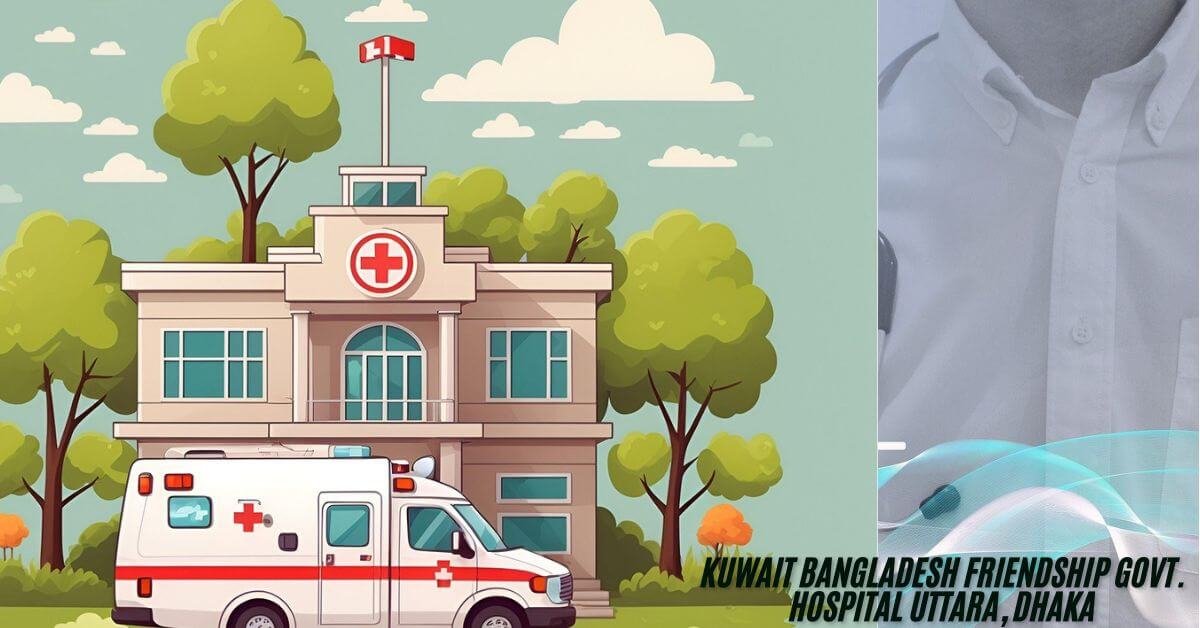Kuwait Bangladesh Friendship Government Hospital is a significant healthcare facility, though obtaining a complete, verified directory of its medical professionals can be difficult. Detailed public records, including full doctor profiles, specialties, and contact details, aren’t easily found on the hospital’s official website or a centralized government database.
Hospital Contact and Location :
Founded: June 10, 2001
Number of beds: 200
Phone: 01720-013923
Address : Isakha Avenue, Sector 6, Uttara, Dhaka 1230, Bangladesh
Email : kbfgh@hospi.dghs.gov.bd
Website : kuwaitmoitreehospital.gov.bd
Kuwait Bangladesh Friendship Government Hospital (Uttara, Dhaka)
1. History & Background :
Kuwait Bangladesh Friendship Government Hospital (KBFGH) is located in Sector 6, Uttara, Dhaka—on Isha Khan Avenue, behind RAJUK Uttara Model College.
The hospital was established with funding from the Kuwaiti Joint Relief Committee, aimed at providing healthcare for the underprivileged. Construction was reportedly completed around 1996, and the hospital was formally inaugurated on 10 June 2001 by Prime Minister Sheikh Hasina.
In 2002, after the Kuwaiti Joint Relief Committee withdrew its funding, the hospital was leased to the American Hospital Consortium under an agreement to upgrade the facility to international standards. The consortium failed to meet its commitments and was subsequently sued; by around 2009, the Bangladesh government regained control of the hospital.
In June 2016, administrative responsibility for KBFGH was transferred to Kurmitola General Hospital.
During the COVID-19 pandemic, KBFGH became one of the first designated public hospitals in Bangladesh for coronavirus patient treatment.
In 2025, the hospital installed Bangladesh’s first sustainable hospital wastewater treatment plant—a 24 kL/day membrane bioreactor (MBR)-based system—ensuring compliance with national environmental regulations.
2. Facilities & Equipment :
Infrastructure & Capacity
The hospital covers about 3 acres of land and has a seven-storey building.
It accommodates approximately 200 beds.
There are around 26 ICU beds, though operational capacity has varied due to staffing and equipment constraints.
Services & Departments :
KBFGH provides outpatient (OPD), emergency, inpatient, and cabin services, with about 22 departments spanning major specialties such as:
-
General Surgery
-
Orthopaedics
-
Obstetrics & Gynaecology
-
Neurology
-
Nephrology
-
Gastroenterology / Hepatology
Additional Services :
Dialysis (kidney care)
Diagnostic facilities: X-ray, ultrasonography (USG), ECG, and laboratory tests (blood, urine, etc.)
Equipment & Infrastructure Updates
In April 2020, reports indicated that while 26 ICU beds existed, many could not be used due to shortages in manpower, ventilators, oxygen supply, and electrical capacity.
In early 2025, a six-stage 24 kL/day MBR wastewater treatment system was commissioned to recycle water for non-potable use.
Recent procurement notices include tenders for new medical instruments, chemicals, and hospital linen.
3. Costs & Financial Aspects
As a government hospital, KBFGH provides services at very low cost.
Outpatient ticket: Tk 10 (as listed in several directories).
Diagnostic tests: Described as “very low cost”, though detailed tariffs are not consistently published.
ICU and inpatient care: Generally cheaper than private hospitals, though total expenses may rise depending on medication, tests, and consumables.
In government hospitals, ICU costs typically range between Tk 2,000–5,000 per day.
Challenges
During the pandemic, the hospital faced under-resourcing—several ICU beds remained unused due to equipment and staffing shortages.
Audits on COVID-19 fund utilization have also cited KBFGH among hospitals with reported financial irregularities.
4. Strengths & Challenges
Strengths
-
Conveniently located in Uttara, serving a large urban population.
-
Provides affordable healthcare relative to private hospitals.
-
Large infrastructure footprint (3 acres, 7-storey) allows for future expansion.
-
Recent environmental modernization (wastewater plant).
-
Demonstrated capacity to respond during national health emergencies (e.g., COVID-19).
Challenges
-
Periodic staffing and equipment shortages have limited service delivery.
-
Incomplete infrastructure (e.g., oxygen lines, electrical substation) affected ICU readiness.
-
Transparency gaps in cost and service information.
-
Reports of staff absenteeism and operational lapses during the pandemic period.
5. Summary
The Kuwait Bangladesh Friendship Government Hospital (KBFGH) in Uttara, Dhaka, is a public hospital built with Kuwaiti aid, inaugurated in 2001, and currently operated under the Ministry of Health & Family Welfare.
With around 200 beds, multiple specialties, and core facilities including ICU, emergency, diagnostic, and dialysis services, it serves as a vital low-cost healthcare provider for the community.
Despite its strong infrastructure and affordable pricing, KBFGH continues to face challenges in staffing, equipment availability, and operational efficiency. Ongoing modernization efforts—such as the installation of an advanced wastewater treatment plant—reflect progress toward more sustainable healthcare infrastructure in Bangladesh.
Patient advice: Before visiting, contact the hospital to confirm service availability, bed status, and estimated costs for specific treatments or tests.

